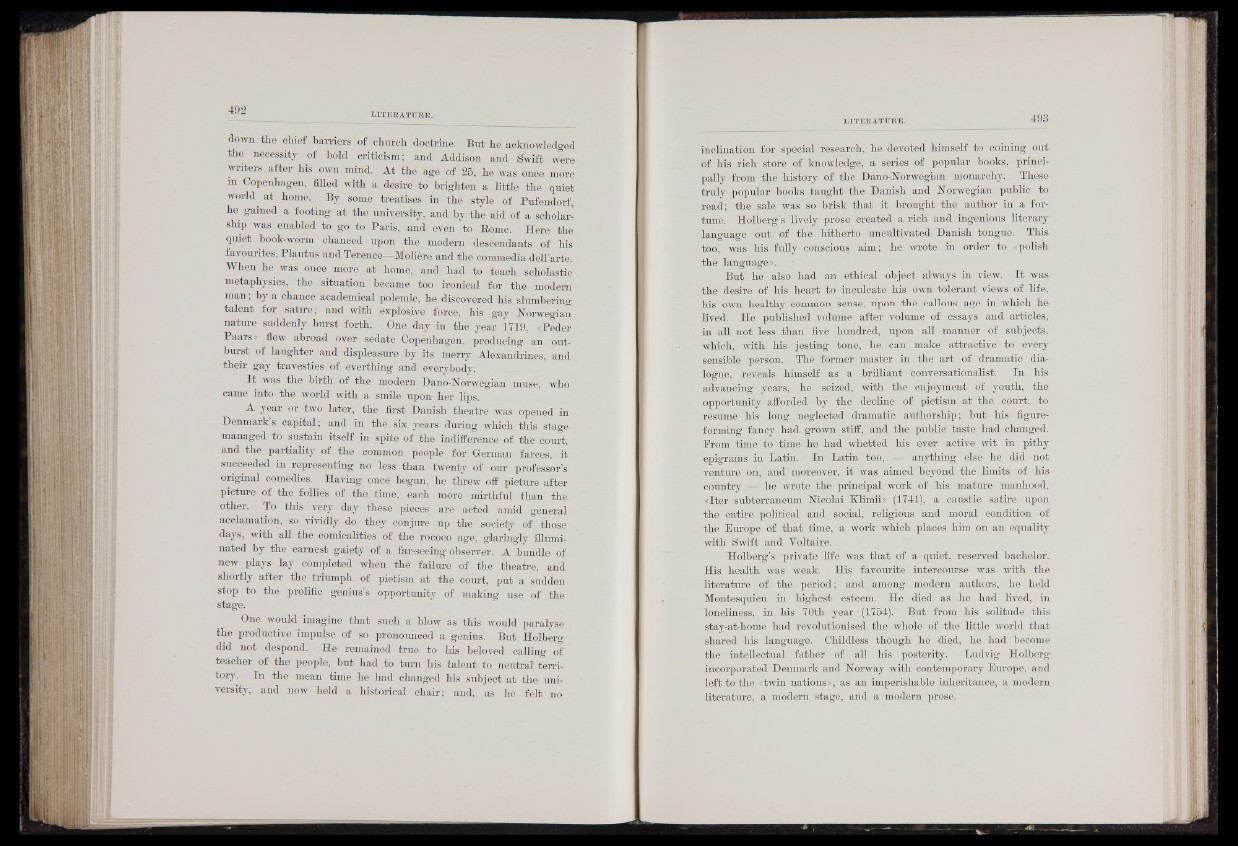
down the chief barriers of church doctrine. But he acknowledged
the necessity of bold criticism; and Addison and Swift were
writers after his own mind. At the age of 25, he was once more
m Copenhagen, filled with a desire to brighten a little the quiet
world at home. By some treatises in the style of Pqfendorf,
he gained a footing at the university, and by the aid of a scholarship
was enabled to go to Paris, and even to Borne. Here the
quiet book-worm chanced upon the modem descendants of his
favourites, Plautus and Terence—Molière and the eommedia dell’arte.
When he was once more at home, and had to teach scholastic
metaphysics, the situation became too ironical for the modern
man; by a chance academical polemic, he discovered his slumbering
talent for satire; and with explosive force, his gay Norwegian
nature suddenly burst forth. One day in the year 1719, «Peder
Paars» flew abroad over sedate Copenhagen, producing an outburst
of laughter and displeasure by its merry Alexandrines, and
their gay travesties of everthing and everybody.
I t was the birth of the modern Dano-Norwegian muse, who
came into the world with a smile upon her lips.
A year or two later, the first Danish theatre was opened in
Denmark s capital ; and in the six years during which this stage
managed to sustain itself in spite of the indifference of the court,
and the partiality of the common people for German farces, it
succeeded in representing no less than twenty, of our professor’s
original comedies. Having once begun, he threw off picture after
picture of the follies of the time, each more mirthful than the
other. To this very day these pieces are acted amid general
acclamation, so vividly do. they conjure up the society of those
days, with all the comicalities of the rococo age, glaringly illuminated
by the earnest gaiety of a far-seeing observer. A bundle of
new plays lay completed when the failure of the theatre, and
shortly after the triumph of pietism at the court, put a sudden
stop to the prolific genius’s opportunity of making use of the
stage.
One would imagine that such a blow as this would paralyse
the productive impulse of so pronounced a genius. But Holberg
did not despond. He remained true to his beloved palling 0f
teacher of the people, but had to turn his talent to neutral territory.
In the mean time he had changed his subject at the university,
and now held a historical chair;,, and, as he felt no
inclination for special research, he devoted himself to coining out
of his rich store of knowledge, a series of popular books, principally
from the history of the Dano-Norwegian monarchy. These
truly popular books taught the Danish and Norwegian public to
read; the sale was so brisk that it brought the author in a fortune,
Holberg’s lively prose created a rich and ingenious literary
language out of the hitherto 'uncultivated Danish tongue. This
too, was his fully conscious aim; he wrote in order to «polish
the language».
But he also had an ethical object always in view. I t was
the desire of Ms heart to inculcate his own tolerant views of life,
his own healthy common sense, upon the callous age in which he
lived. He published volume after volume of essays and articles,
in all not less than five hundred, upon all manner of subjects,
which, with his jesting tone, he can make attractive to every
sensible person. The former master in the art of dramatic dialogue,
reveals himself as a brilliant conversationalist. In his
advancing years, he seized, with the enjoyment of youth, the
opportunity afforded by the decline of pietism at the court, to
resume his long neglected dramatic authorship; but Ms figure-
forming fancy had grown stiff, and the public taste had changed.
From time to time he had whetted his ever active wit in pithy
epigrams in Latin. In Latin too, anything else he did-not
venture on, and moreover, it was aimed beyond the limits of Ms
country he wrote the principal work of his mature manhood,
«Iter subterraneum Nicolai Elimii» (1741), a caustic satire upon
the entire political and social, religious and moral condition of
the Europe of that time, a work which places him on an- equality
with Swift and Yoltaire.
Holberg’s private life was that of a quiet, reserved bachelor.
His health was weak. His favourite intercourse was with the
literature of the period; and among modem authors, he held
Montesquieu in highest esteem. He died as he had lived, in
loneliness, in his 70th year (1754). But from his solitude this
stay-at-home had revolutiomsed the whole of the little world that-
shared his language. Childless though he died, he had become
the intellectual father of all his posterity. Ludvig Holberg
incorporated Denmark and Norway with contemporary Europe, and
left to the «twin nations», as an imperishable inheritance, a modern
literature, a modem stage, and a modern prose.